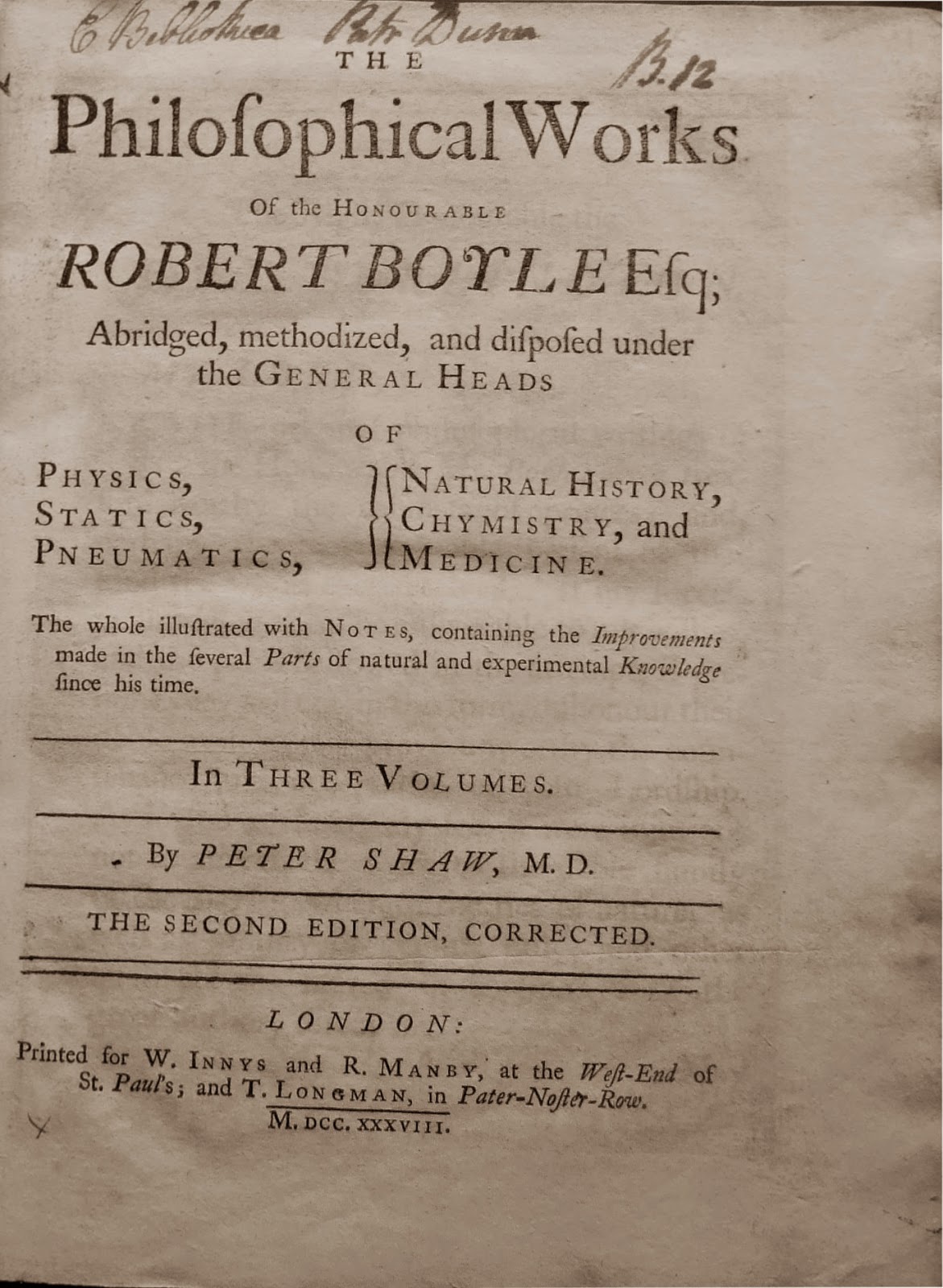Robert Boyle in the collections of Dun's Library
|
|
Line engraving of Boyle by J Kerfesboom
from a drawing by George Vertue.
Held in the RCPI Archive collections
|
Robert
Boyle (1627–1691) was born in Lismore Castle, County Waterford. He was the seventh son and
fourteenth child of Richard Boyle, 1st Earl of Cork (reputed to be the richest man in Ireland and
Britain), and Catherine Fenton. A major figure in the development of modern experimental science, Robert Boyle has been called 'The Father of Chemistry’. Boyle also made major contributions to
physics, medicine and the life sciences, and is perhaps best known for his
demonstration of the inverse relationship between the volume of gas and its
pressure – now known as Boyle’s Law. A deeply religious man, he also wrote
extensively on philosophy and theology.
Books
relating to Boyle’s scientific, medical and religious writings are all
represented in the library collections
of the Royal College of Physicians of Ireland.
One such work is The
philosophical works of the Honourable Robert Boyle Esq, compiled by Peter Shaw and published in three volumes in London in
1738. The philosophical works collects
numerous writings by Boyle on the subjects of physics, statics, pneumatics,
natural history, chemistry, and medicine.
 |
Title page of The Philosophical Works of
the Honourable Robert Boyle Esq
|
In
the general preface to this collection of writings, Shaw celebrates Boyle’s
many achievements. He refers to Boyle’s
pioneering use of experiments and the scientific method, stating that ‘he well knew, that experiments are the life
and soul of natural knowledge’, which have left ‘such foundations for farther discoveries, as can only be fully
prosecuted and applied by the Boyles and Newtons of future ages’. Shaw praises
Boyle’s new rational approach whereby ‘He
never raises an hypothesis to solve phenomena; but if the solution does not of
itself grow out of them, when attentively considered, he leaves all as he found
it; and awaits further discoveries to inform him’. Shaw also
articulates how Boyle viewed scientific knowledge and religious belief as
compatible in the following passage:
‘He will never allow us to consider the world as a rude
heap of dull, inactive matter; but convinces us, that it is a grand and noble
machine, continually actuated, inform’d, and governed by a most wise and
beneficent Being, who keeps all the parts thereof in motion, and makes them act
upon one another, according to certain laws’.
You can access RCPI's collection of Robert Boyle's books by making an appointment. Email heritagecentre@rcpi.ie for more details.
Fergus Brady,
Project Archivist
These works include:
Robert Boyle, Some motives and incentives to the love of God.
Pathetically discours'd of in a letter to a friend (London, 1692);
Robert Boyle, The philosophical works of the Honourable Robert Boyle Esq. Vol. 1 (London,
1738);
Valentine Greatraks, A brief
account of Mr Valentine Greatraks, and divers of the strange cures by him
lately performed. Written by himself in a letter addressed to the Honourable
Robert Boyle Esq (London,
1666);
Caoimhghin S Breathnach, Robert Boyle's approach to
the ministrations of Valentine Greatrakes (London, 1999), and
Catalogue of lantern
slides for lectures on ventilation and working models and diagrams of the
"Boyle" system of ventilation - natural - and other systems for
college and school hygiene classes and museums (London, 1900).
Robert Boyle, The philosophical works of the
Honourable Robert Boyle Esq. Vol. 1(London, 1738), p. v.